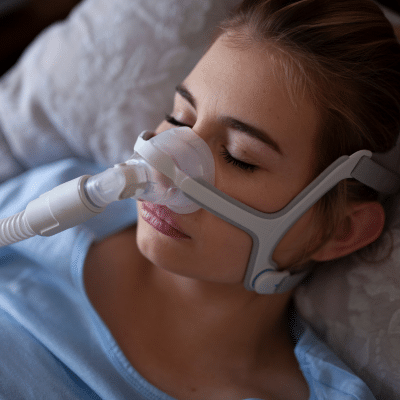
Understanding Snoring
Snoring is the result of obstructed airflow through the airway during sleep, causing the soft tissues in the throat to vibrate and produce the characteristic sound. While occasional snoring may be harmless, chronic or loud snoring can be a sign of underlying issues, including obstructive sleep apnea (OSA). Typical factors that lead to snoring include:
- Nasal congestion or blockage
- Enlarged tonsils or adenoids
- Obesity or excess weight around the neck
- Alcohol consumption or sedative medications
- Sleeping position or posture
It’s essential to address snoring promptly to prevent potential complications and improve overall sleep quality and daytime function.
Exploring Sleep Apnea
Sleep apnea is a sleep disorder marked by recurring interruptions in breathing or shallow breaths while asleep. These breathing disruptions can occur dozens or even hundreds of times per night, leading to fragmented sleep and reduced oxygen levels in the body. The primary types of sleep apnea are:
- Obstructive Sleep Apnea (OSA): The most common form of sleep apnea, OSA occurs when the muscles in the throat relax and collapse, obstructing the airway and causing breathing difficulties during sleep.
- Central Sleep Apnea (CSA): Less common than OSA, CSA occurs when the brain fails to send signals to the muscles that control breathing, resulting in pauses in breathing during sleep.
Sleep apnea can lead to severe health repercussions, such as:
- Daytime fatigue and drowsiness
- Poor concentration and memory problems
- Increased risk of accidents or injuries
- High blood pressure and cardiovascular disease
- Type 2 diabetes and metabolic disorders
- Depression, anxiety, and mood disturbances
Given the potential health risks associated with sleep apnea, it’s crucial to seek evaluation and treatment from a qualified healthcare provider.
The Connection to ENT Health
Snoring and sleep apnea are closely linked to ENT health, as they can both arise from anatomical abnormalities or structural issues in the nose, throat, or airway. Common ENT-related factors that contribute to snoring and sleep apnea include:
- Nasal congestion or obstruction: Chronic nasal congestion or blockage due to allergies, sinusitis, or deviated septum can impede airflow and exacerbate snoring and sleep apnea.
- Enlarged tonsils or adenoids: In children and adults, enlarged tonsils or adenoids can obstruct the airway and contribute to snoring and sleep apnea.
- Narrow airway or palate: Anatomical variations such as a narrow airway or elongated soft palate can increase the risk of airway collapse and breathing difficulties during sleep.
- Obesity or excess weight: Excess weight, particularly around the neck and throat, can put pressure on the airway and contribute to snoring and sleep apnea.
Diagnosis and Treatment Options
If you or a loved one are experiencing symptoms of snoring or sleep apnea, it’s essential to seek evaluation and treatment from an ENT specialist or sleep medicine physician. The diagnostic process may involve:
- Medical history and physical examination
- Overnight sleep study (polysomnography)
- Nasal endoscopy or imaging studies (CT or MRI scans)
Once a diagnosis is confirmed, treatment options for snoring and sleep apnea may include:
- Lifestyle modifications: Weight loss, smoking cessation, and avoidance of alcohol or sedatives before bedtime can help reduce snoring and improve sleep quality.
- Continuous positive airway pressure (CPAP) therapy: CPAP therapy utilizes a mask connected to a machine, delivering a steady stream of air to maintain an open airway during sleep.
- Oral appliance therapy: Custom-fitted oral appliances can help reposition the jaw and tongue to prevent airway collapse and reduce snoring and sleep apnea symptoms.
- Surgical interventions: In some cases, surgical procedures such as tonsillectomy, adenoidectomy, uvulopalatopharyngoplasty (UPPP), or nasal surgery may be recommended to address anatomical issues and improve airflow.
Contact Us Today
Snoring and sleep apnea are complex sleep disorders that can have significant implications for ENT health and overall well-being. By understanding the connection between snoring, sleep apnea and ENT health, individuals can take proactive steps to address underlying issues and improve sleep quality and daytime function. At Commonwealth ENT, our team of experienced ENT specialists is dedicated to providing comprehensive evaluation and personalized treatment options for patients with snoring and sleep apnea. If you or a loved one are experiencing symptoms of snoring or sleep apnea, don’t hesitate to contact us for expert care and support. Together, we can help you achieve better sleep and optimal ENT health for a healthier, happier life.
